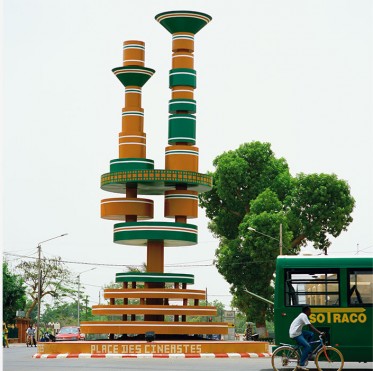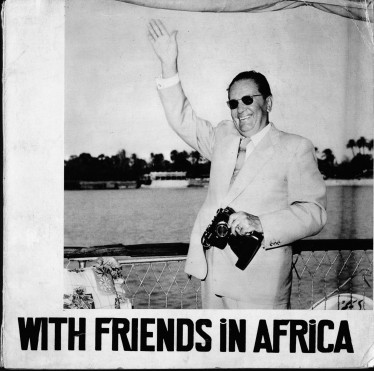
Christabelle Peters, University of Warwick
“Yo u cannot talk about Nelson Mandela and UNITA in the same sentence,” came the stern but muted admonishment from an elderly Kenyan man standing erectly with head slightly bowed, unwilling to meet my bemused gaze. He was struggling to maintain a respectful tone as he addressed me, one of the three scholars invited to form a panel titled ‘Red Africa: Power, Liberation and the Geopolitics of the Soviet Union’ as part of the Red Africa season of art, film, talks and events exploring the legacy of cultural relationships between Africa, the Soviet Union and other communist countries during the Cold War, hosted by the London art gallery, Calvert 22, in conjunction with the Royal African Society. But then, in front of the packed house, he brusquely added that the meeting I had just described between the recently-freed Mandela and Jonas Savimbi, head of UNITA, had “never taken place,” and that he knew this because he had “been there.” Unsure as to where exactly “there” was, I replied that I had it on good authority, from trusted sources who had also “been there,” that the meeting had indeed occurred, and for previously-unknown reasons that they had revealed to me. The exchange ended with a pointed ‘invitation’ for a sit-down meeting with my sources and himself in order to get to the truth of it all. I accepted with relish, and with no ill-will whatsoever. You see, unlike my fellow panellist Miles Larmer from Oxford, who looked over at me with some alarm when the challenge arose from the floor, I am familiar with the frequently emotive blowback that can result from revealing what I call ‘hidden histories,’ in other words, those events that do not fit neatly within the ideological lines that get drawn in official discourse, especially during times of crisis. I am speaking here of things that, as Meera Sabaratnam (a lecturer at SOAS and the third panellist) coolly pointed out, demonstrate that other kinds of allegiances can and often do override political alliances.
u cannot talk about Nelson Mandela and UNITA in the same sentence,” came the stern but muted admonishment from an elderly Kenyan man standing erectly with head slightly bowed, unwilling to meet my bemused gaze. He was struggling to maintain a respectful tone as he addressed me, one of the three scholars invited to form a panel titled ‘Red Africa: Power, Liberation and the Geopolitics of the Soviet Union’ as part of the Red Africa season of art, film, talks and events exploring the legacy of cultural relationships between Africa, the Soviet Union and other communist countries during the Cold War, hosted by the London art gallery, Calvert 22, in conjunction with the Royal African Society. But then, in front of the packed house, he brusquely added that the meeting I had just described between the recently-freed Mandela and Jonas Savimbi, head of UNITA, had “never taken place,” and that he knew this because he had “been there.” Unsure as to where exactly “there” was, I replied that I had it on good authority, from trusted sources who had also “been there,” that the meeting had indeed occurred, and for previously-unknown reasons that they had revealed to me. The exchange ended with a pointed ‘invitation’ for a sit-down meeting with my sources and himself in order to get to the truth of it all. I accepted with relish, and with no ill-will whatsoever. You see, unlike my fellow panellist Miles Larmer from Oxford, who looked over at me with some alarm when the challenge arose from the floor, I am familiar with the frequently emotive blowback that can result from revealing what I call ‘hidden histories,’ in other words, those events that do not fit neatly within the ideological lines that get drawn in official discourse, especially during times of crisis. I am speaking here of things that, as Meera Sabaratnam (a lecturer at SOAS and the third panellist) coolly pointed out, demonstrate that other kinds of allegiances can and often do override political alliances.
He brusquely added that the meeting I had just described between the recently-freed Mandela and Jonas Savimbi, head of UNITA, had “never taken place,” and that he knew this because he had “been there.”
At the end of the discussion, my Kenyan interlocutor did manage to shake off his discomfiture at my perceived transgressions, and we shook hands warmly. I even asked for (and received) his email address, with the half-joking explanation that it was to arrange the proposed stand-off between him and my UNITA sources. And then suddenly I was surrounded by other members of the audience, all confessing that they had never seen the side of UNITA revealed in the clip I had shown (from António Escudeiro’s documentary, A Independência de Angola). Viewing the film for the first time with its Angolan-born director had also been an eye-opener for me, who had come-of-age during the uncompromising hey-day of the British anti-apartheid movement, back when The Specials were making the ska-music plea to “Free Nelson Mandela”.

 All the same, this brief flash of discord did have the effect of highlighting a couple of important issues. First, it underscored the relevance of the question that I had raised in my opening presentation, which was whether the synchronous movements of international socialism and pan-Africanism on the African continent can be considered to be convergent or dissonant. And, secondly, it demonstrated why academics stand to benefit from taking their research beyond the boundaries of the university campus and engaging with the wider society. This, my first foray into the world of public events, had brought me face-to-face with hard bitten foreign correspondents from the major international news agencies, former guerrilla fighters, as well as individuals who had once made up the hopeful throngs watching liberation activists take up new positions of government in their countries. In other words, here were real people with real-life experiences, and not the disembodied subjects of books and journal articles. After the initial wave of nervousness had subsided, I felt an unanticipated sense of responsibility towards this public, that my scholarship should add new layers of meaning and understanding to the history many of them had lived. Such encounters can mean that, like the title of the art exhibition that accompanies Red Africa, which comes from Chinua Achebe’s 1958 classic novel, Things Fall Apart, certain dearly-held opinions and ideas can be shaken or even collapse. But that is perhaps the promising point at which ontological empathy can arise.
All the same, this brief flash of discord did have the effect of highlighting a couple of important issues. First, it underscored the relevance of the question that I had raised in my opening presentation, which was whether the synchronous movements of international socialism and pan-Africanism on the African continent can be considered to be convergent or dissonant. And, secondly, it demonstrated why academics stand to benefit from taking their research beyond the boundaries of the university campus and engaging with the wider society. This, my first foray into the world of public events, had brought me face-to-face with hard bitten foreign correspondents from the major international news agencies, former guerrilla fighters, as well as individuals who had once made up the hopeful throngs watching liberation activists take up new positions of government in their countries. In other words, here were real people with real-life experiences, and not the disembodied subjects of books and journal articles. After the initial wave of nervousness had subsided, I felt an unanticipated sense of responsibility towards this public, that my scholarship should add new layers of meaning and understanding to the history many of them had lived. Such encounters can mean that, like the title of the art exhibition that accompanies Red Africa, which comes from Chinua Achebe’s 1958 classic novel, Things Fall Apart, certain dearly-held opinions and ideas can be shaken or even collapse. But that is perhaps the promising point at which ontological empathy can arise.
Red Africa runs from 4 February – 3 April 2016:
http://calvert22.org/red-africa/
Copyright Christabelle Peters 2016.